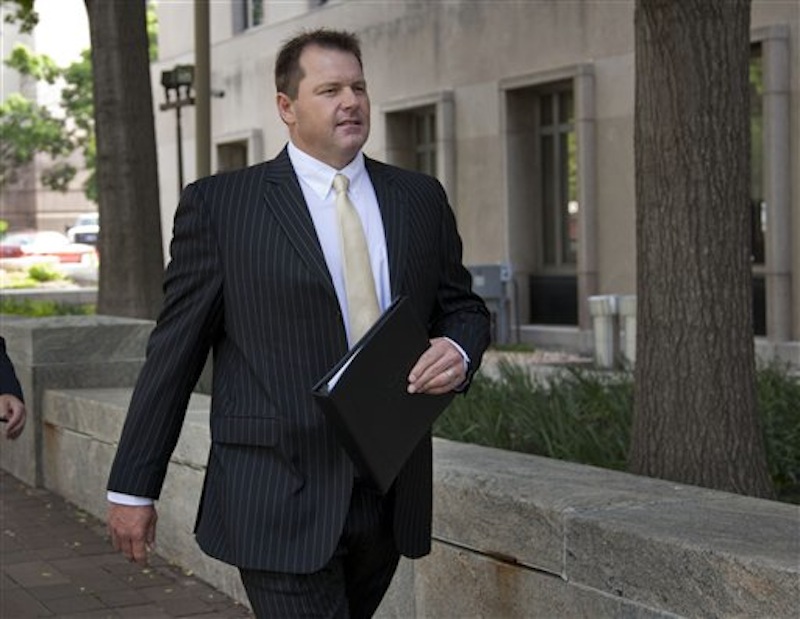WASHINGTON — Scolded by the judge for putting on a slow and “boring” trial, prosecutors in the Roger Clemens case livened things up by introducing a convicted drug dealer who talked way too fast.
Kirk Radomski, the former New York Mets batboy who provided drugs to dozens of major league baseball players, took the stand Tuesday and described a shipment of human growth hormone he sent to Clemens’ house about a decade ago.
Radomski showed the jury an old, torn shipping label he found under his television set in his bedroom in June 2008. Federal agents had failed to find the label when they searched his home three years earlier — because they apparently didn’t look under what Radomski called his huge, old-model “dinosaur of a TV.”
The label was addressed to Brian McNamee, Clemens’ former strength coach, at Clemens’ home address in Texas. Radomski said the shipment was for two kits of HGH — “about 50-100 needles” — that he estimated occurred in 2002.
McNamee has said he injected Clemens with HGH and steroids. Clemens denied to Congress in 2008 that he took either drug, which led to the perjury charges against him. The first attempt to try the 11-time All-Star pitcher last year ended in a mistrial.
The defense is expected to emphasize that the label lists McNamee, instead of Clemens, as the recipient. McNamee would often stay at Clemens’ house during training sessions.
On a relatively busy day at the trial, U.S. District Judge Reggie Walton also ruled that the government could not introduce Clemens’ contract with the Boston Red Sox as evidence that he was motivated by money to extend his career. The jury heard from five witnesses — more than have appeared in the rest of the trial combined.
None riveted the jury like Radomski, easily the most entertaining witness so far. Only hours earlier, Walton began the day saying how bored the jurors had become as the trial trudged through its fourth week.
Swiveling in the witness chair, Radomski spoke so energetically and in such extraordinary detail in his pronounced Bronx accent that the court reporter repeatedly had to tell him to slow down. He described how he started using steroids and HGH himself some 20 years ago, then starting selling them. One of his customers was McNamee.
Radomski called himself a “health nut” despite his past association with performance-enhancing drugs. He stumbled over pronunciations and spellings, at one point saying: “Hey, I’m from the Bronx. I’m not a scholar.” He boldly suggested the judge get an “orthopedic chair” to deal with recurring back problems.
He stood and unbuttoned his coat to show the jury where on the body he would perform injections. He described the sizes of needles used for various injections. He said pitchers take performance-enhancing drugs for strength and endurance, not to bulk up their muscles. He knocked on the witness stand to describe the “knock at the door” he received when feds arrived to search his house in 2005.
Radomski cooperated with investigators and pleaded guilty to money laundering and distribution of a controlled substance in 2007.
Even Clemens, who has been watching calmly from the defense table and taking notes, was more animated. He tapped his fingers a lot, stared more intently and rubbed his hair.
Radomski will return to the stand Wednesday.
Earlier in the day, Walton turned down the government’s attempt to display Clemens’ Red Sox contract. The judge said showing the multimillion-dollar salaries to a jury that knows little about baseball could be prejudicial against Clemens because some people think professional athletes make an “obscene” amount of money.
“I just think we don’t put someone on trial for the amount of money they make,” Walton said.
The judge was in a stern mood all day, from the moment he first took his seat to give a tongue-lashing to both sets of lawyers. This trial was supposed to last four to six weeks, but it is now Week 4 — thanks to a lengthy jury selection, breaks scheduled around the judge’s and jurors’ schedules, acrimonious debates among the lawyers that frequently disrupt testimony and the plodding pace set by prosecutors who, for example, decided Tuesday that the jurors needed to see four generic exterior photos of the Toronto Blue Jays stadium.
The government has said it doesn’t expect to call its key witness, McNamee, until next week.
“Those folk are fed up because they see their time being wasted!” Walton, his voice rising, said before the jury entered the room.
The pace has been so slow and so scattershot that one of the jurors is apparently having trouble understanding what it is actually about. Walton said a juror asked the judge’s law clerk if the judge would advise what the charges are, an indication of how “far afield” the proceedings had wandered.
“When you create a boring environment which is being created in this case, it precipitates jurors to talk about the case,” Walton said. “They are bored.”
When jurors entered the room, Walton scolded them too, but more gently. He reminded them not to have any discussions about the case until it’s time for deliberations.
The first witness was John Longmire of the FBI, who was back for a second day and wrapped up his testimony quickly. He was followed by three men who have worked with Clemens as athletic trainers: Charlie Moss and Jim Rowe from Clemens’ years with the Boston Red Sox, and Tommy Craig from Clemens’ stint with the Blue Jays.
Moss, Rowe and Craig testified that team employees such as strength and conditioning coaches would not be authorized to give players shots of B12 or of lidocaine, a common local anesthetic. Clemens has said he received B12 and lidocaine shots from McNamee when McNamee was the strength and conditioning coach for the Blue Jays in 1998.
Send questions/comments to the editors.



Comments are no longer available on this story